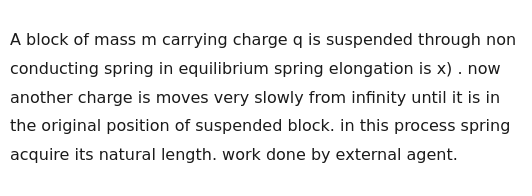Question
Question: A block of mass m carrying charge q is suspended through non conducting spring in equilibrium spring...
A block of mass m carrying charge q is suspended through non conducting spring in equilibrium spring elongation is x) . now another charge is moves very slowly from infinity until it is in the original position of suspended block. in this process spring acquire its natural length. work done by external agent.

W_{\text{ext}}=-\frac{5}{2}mg,x
Solution
We start by noting that initially the charged block (charge q, mass m) is in equilibrium when suspended from a non‐conducting spring. Its weight is balanced by the spring force:
mg=kx⟹k=xmg.The process is as follows:
-
Initial state:
- The block is at a distance L0+x from the fixed point (where L0 is the natural length of the spring) so that the spring is stretched by x.
- Gravitational energy: If we choose the reference at the natural length (y=L0) then
- Spring energy:
- Electric energy: The external charge is at infinity so Ue,i=0.
-
Final state:
The external charge (assumed of magnitude q for concreteness) is brought slowly from infinity to the original block’s position L0+x (fixed in space) while the block moves upward so that the spring becomes unstretched (block now at y=L0). Now the distance between the two charges is x.
* **Gravitational energy:** Now,
$$
U_{g,f}=mg\,(0)=0.
$$
* **Spring energy:** The spring is at its natural length so
$$
U_{s,f}=0.
$$
* **Electric energy:**
For two point charges q and q (of opposite sign, so that the electric force is attractive and helps lift the block) the interaction energy is Ue,f=−xkeq2. But note that the final equilibrium requires the upward electric force to exactly balance the weight: x2keq2=mg⟹keq2=mgx. Thus, Ue,f=−xmgxx=−mgx.
- Change in the System’s Energy: ΔU=Uf−Ui=[0+0+(−mgx)]−[mgx+21mgx+0] ΔU=−mgx−23mgx=−25mgx.
Because our process is quasi‐static, the net work done on the system by conservative forces equals −ΔU. However, here note that the external agent is moving the external charge against (or rather controlling) the attractive force so that the net energy change of the system is −25mgx. Thus the work done by the external agent is exactly the change in the overall energy of the system:
Wext=−25mgx.A negative work means that the external agent actually extracts energy from the system (i.e. it must “hold back” the charge as the attractive force tries to accelerate it).
